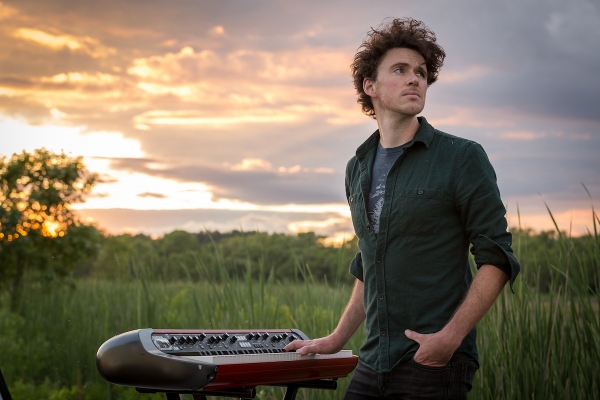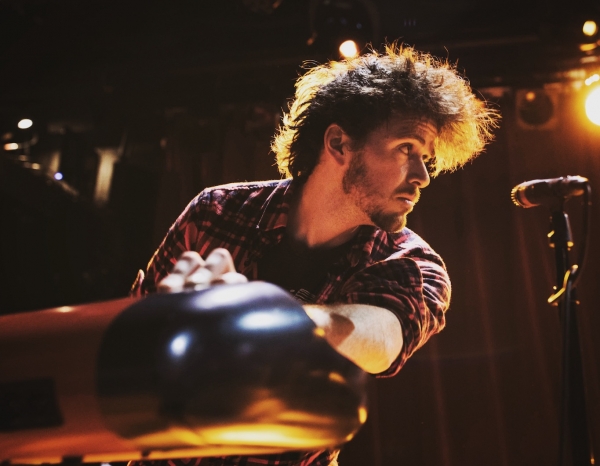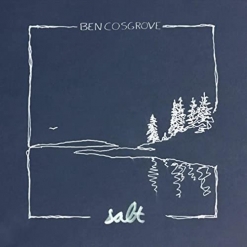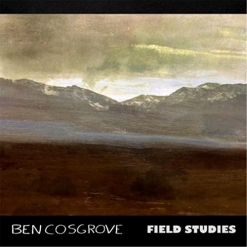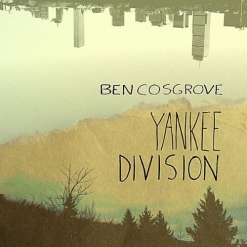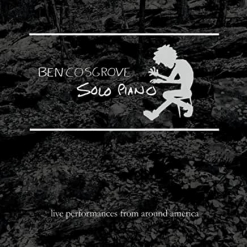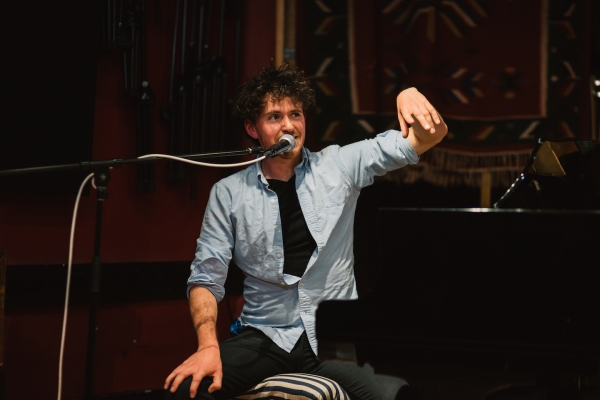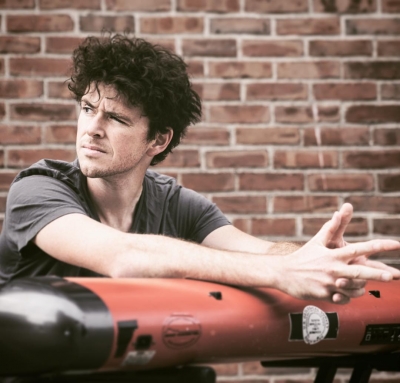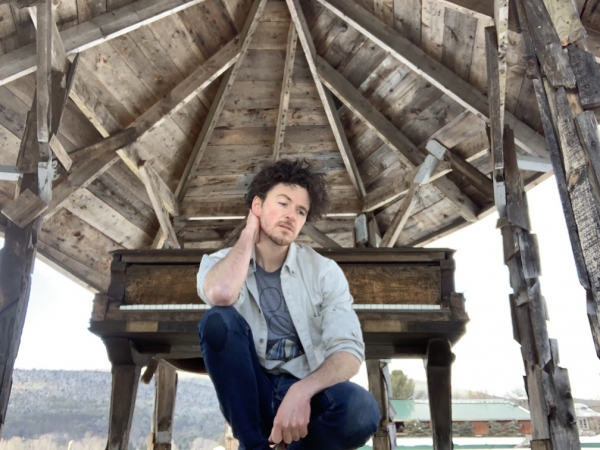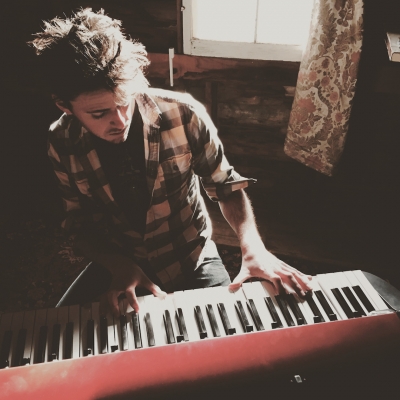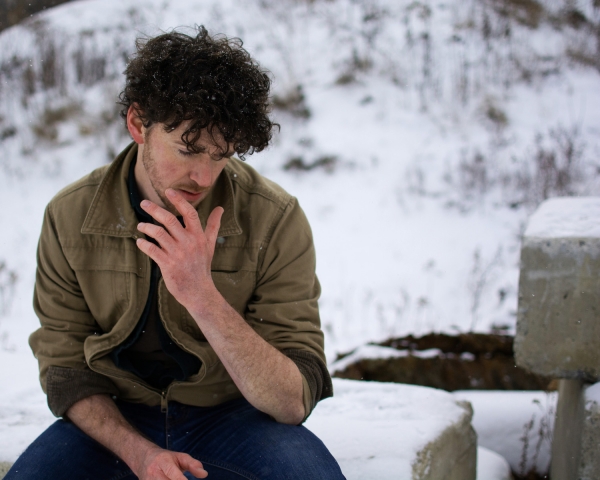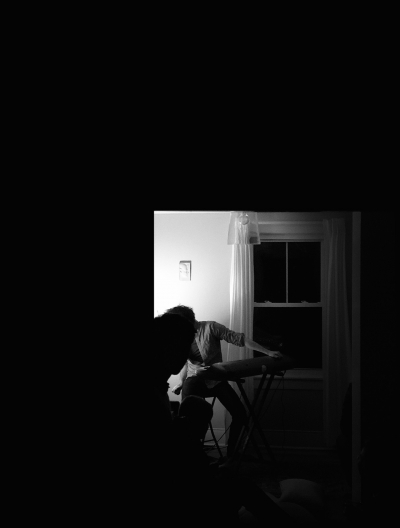Ben Cosgrove is an artist who came to my attention earlier this year - and I'm so glad he did! He is a pianist/composer, but that barely scratches the surface. On his most recent album,
The Trouble With Wilderness, Ben performs on an incredible assortment of instruments in addition to several pianos and keyboards.
In a nutshell, Ben composes music about nature and has done Artist in Residencies at quite a number of parks and wilderness areas, spending a big part of his time driving from one place to the next. The outbreak of COVID-19 changed all that and kept him much closer to home. Also a contributing writer for some very impressive journals and publications, it's hard to believe that Ben is only 33. His story is fascinating and I think you'll enjoy getting to know Ben and his music! We did this interview via email in July 2021.
KP: Hi Ben! Your bio is almost as amazing as your music! You have done so many different things for someone in his early 30's. Let's do something of an overview first, and then we'll get more specific.
I recently reviewed your latest album,
The Trouble With Wilderness, and really enjoyed it. We'll talk about the music, but first, where did the title come from?
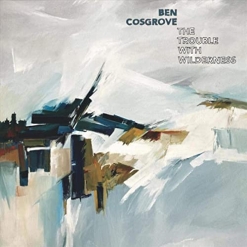
Click on album cover
to go to Kathy's review.
BC: Yes, thanks so much for your kind review! I was thrilled, in reading it, to see just how closely you'd listened to everything in there, which was very gratifying. The title is borrowed from an essay by the environmental historian William Cronon -- it's a piece from 1995 in which he cautions against conflating the ideas of wilderness and wildness, or of depending on any model of conservation that might lead us to think of some landscapes as pristine and others as compromised. He talks at one point about how it's important to remember that a tree in your backyard is every bit as wild and interesting and worthy of wonder as one that you'd find in the middle of a national park.
KP: Hmmm. That's a really interesting perspective!
The idea for the album has an interesting story. Let's talk about that a bit.
BC: Yeah! Sorry, that will probably help the title make more sense, too -- I've spent the last decade or so writing all my music about landscape, and one thing that's led to for me over the last several years has been a bunch of collaborations with places like national parks, national forests, oceanographic institutes, and wilderness expedition outfits. These have all been thrilling and gratifying relationships for me, and they've drawn from me music that I never could have made otherwise, but it also built up a repertoire that was largely music about places that normal people tend not to encounter in their everyday lives. I had begun to worry that by sitting onstage every night and raving about these rarefied, hard-to-access landscapes, I might be inadvertently encouraging exactly the kind of environmental worldview that Cronon cautions against in that article. So to course-correct a little bit, I decided I'd try to write a whole album of music that was just about "ordinary" places, or about expressions of nature and wildness in parts of the built environment that we might otherwise overlook or take for granted: plants growing from the sidewalk, weeds crawling up a highway overpass, turbines turning in the wind, a rainstorm in a city -- that kind of thing.
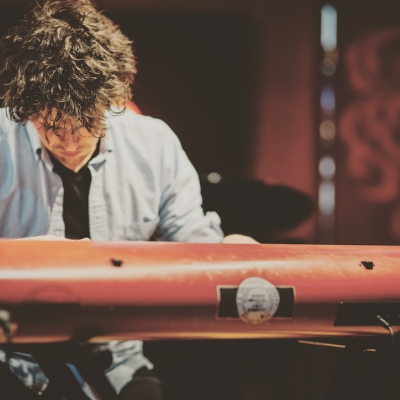
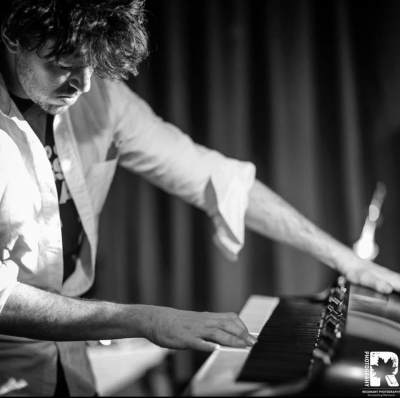
KP: It sounds like prior to the COVID-19 pandemic you were constantly on the road. Are you still mostly at home or have you been able to get out and about again?
BC: Gradually! I'm really optimistic. I've been sort of tiptoeing back into live performances: I'm trying to stick mainly to small or private shows in the summer (and taking on a bunch of sideman work to make up the difference, in large part because I've really missed playing with other people), but I'm finally beginning to line up proper solo shows for September, October, and beyond, which feels wild. I'm very restless generally, which has suited me well as a touring musician but made the pandemic extra-difficult. I wasn't even very good at staying in one place throughout 2020 -- I wound up creating endless excuses to wander around aimlessly, albeit with more of a local scope. I'm very much looking forward to having the structure of shows and rehearsals back to give my schedule and geography some tentpoles again.
KP: So you're kind of a modern-day minstrel! What/where are some of the parks and places where you have done Artist in Residencies?
BC: My first was with Acadia National Park, several years ago, and the timing for that was brilliant in that it was in the late fall, after almost all the tourists had left the area but before the real ice and snow started to come. So for basically my entire residency, I had this thrillingly private experience of such a remarkable place. After that, I was brought back for a yearlong residency by an arts organization at my college, and I've done more or less one residency a year since then: I was at Isle Royale National Park, then the Sitka Center for Art and Ecology on the Oregon coast, then a year with White Mountain National Forest, and then this very cool thing with the Schmidt Ocean Institute where I got to be the artist-at-sea on one of their research trips in the middle of the Pacific Ocean. After that, I had a really great year and a half working with the New England Trail, writing music about different moments along this 200-mile route through southern New England (some of that made it onto the new record!), and then the last thing like this I did pre-pandemic was to be a visiting artist with Chulengo Expeditions, a group that leads treks through different parts of Patagonia and incredibly, brings artists along from time to time. I've never really listed them all out like that, and it's humbling for me to glance over the list -- every single one of these has been meaningful and influential for me, both personally and artistically, and I've been very lucky that opportunities like this have kept coming along and moving my music forward throughout my career. It's nice to be compelled to look at a place you might not have considered critically before, and then have to decide how best to write music about it.
KP: Are those opportunities opening up again?
BC: Yeah, actually! I just came back from a few weeks in residence in the Flint Hills of eastern Kansas, this incredible region where the land was too rocky and hilly to be leveled into the huge agricultural operations you see in most of that state, and has remained a vanishingly rare example of native tallgrass prairie as a result. There's a national preserve there, which was established in 1996, where you can just wander through these gigantic, windy, rolling hills, and it's really unlike anywhere I've ever been.
KP: What incredible experiences! I was especially interested in the Sitka Center for Art and Ecology since it's here in Oregon. I had never heard of it, but it sounds like a fascinating place. How often have you visited/ performed there?
BC: Sitka is a pretty amazing institution; they're out on Cascade Head in Otis, just north of Lincoln City, and they run a series of great art-and-nature-focused workshops in the summer and host both artists and ecologists for these multi-month residencies during the rest of the year. I did a long residency out there during the winter and spring of 2015, and I've felt very attached to the place and its people ever since. For several years until the pandemic hit, I'd go back every summer to teach a workshop about music and place, or music and landscape. My residency with them was my first real extended exposure to the Oregon coast, but I immediately felt completely at home in the Pacific Northwest, and I remain pretty madly in love with the whole region.
KP: Oh good! Then we should be able to meet up sometime. Lincoln City is about two hours north of me.
Your bio states that you have done solo performances in 48 states. Which two are missing? Do you plan to add those anytime soon?
BC: Ha, my remaining two are Delaware and Hawaii! One of those is easy to explain, obviously, but for whatever reason I've also just never had any luck finding a gig in Delaware. (I'm hoping to play in Hawaii first, though, just because frankly, "I've played in every state except Delaware" strikes me as a somewhat more interesting sentence than "I've played in every state but Hawaii.")
KP: Haha! Definitely!
You are also a writer and have been published in some impressive journals and books. Let's talk about that, too.
BC: Yeah! Thanks. I don't know -- I think maybe in part it's because my process for writing music about place requires so much abstraction, I find it satisfying and sort of brain-clearing to write nonfiction, where you're held more directly to facts and narrative. ("She said this," "He went here," "It was this time, on this date," that sort of thing.) I find that compelling myself to work in both mediums, even if I'm spending 90% of my time in just one of them, helps me to remain curious and to think more clearly about the things I'm writing about. Writing essays somehow makes my music better, even though weirdly, I've never really written about music.
KP: It sounds like a really good balance for you!
How many albums have you released so far?
BC: The Trouble With Wilderness is my fourth studio album; its predecessors are Salt (2017), which was about finding ballast and balance in places where the ground itself is undependable and unpredictable, Field Studies (2014), which is a series of pieces about different landscapes around America, and Yankee Division (2011), which I mostly recorded in my college dorm room. There's also a live album out there, which I recorded myself at a bunch of shows throughout 2014 and 2015 -- that one began just as a private attempt to improve my performances by recording and analyzing each one, but then in doing that, I realized that for many of these songs, the live versions had become different enough from the studio versions that it would be worth it to release an album of them.
KP: You have also recorded and performed with a variety of different artists. Who are some of those?
BC: Yeah! This is honestly one of my favorite parts of being a keyboardist, or an instrumentalist generally -- I deeply enjoy the process of figuring out how to add meaningfully to other people's songs or fit into a particular texture. I've wound up working with a lot of folk and Americana musicians, and I've found that I especially love playing piano with banjo players. Some of the artists and bands I've worked with over the years -- some more extensively than others -- include Ghost of Paul Revere, Max Garcia Conover, Steph Jenkins, Kaiti Jones, Darlingside, Joel Thetford, the Social Animals, Saint Anyway, GoldenOak, Connor Garvey, Jamie Kallestad, and a handful of others. Every time I've played with a new person, or a new group, I've discovered something new and interesting about what my instruments can do. I love doing it; anyone out there in search of a keyboardist, please hire me to play in your touring band.
KP: Hey - I hope some really interesting artists respond!
Has your music always focused on landscapes and ecology?
BC: Not necessarily; I've always written music that was directly tied to some nonmusical concept, or somehow about some nonmusical thing, but it was only when I was in college that I slowly discovered this profound interest in landscape, place, and geography. I don't remember ever thinking "I'll just write music about this forever!" but it's sort of worked out that way -- it's such an endlessly interesting area of study, and I've just never stopped being interested in it. Landscape has also turned out to provide an endless set of perfect metaphors for other parts of my experience, and I've often found it helpful and therapeutic to write a song about a particular place, only to realize later that it's really fundamentally a song about loneliness, or exhilaration, or longing, or anxiety.
KP: I'm listening to Salt (2017) right now. What was the concept for that album?
BC: That's actually a perfect example! Salt is actually not-so-secretly a breakup album: I had a relationship end pretty miserably, and the whole thing left me feeling ungrounded, unmoored, and just generally shipwrecked -- like I couldn't depend on the ground beneath me. So the strategy I landed on for meaningfully processing all of that in my work was to write an album about places where that was literally true: all the songs on Salt are about estuaries, fault lines, tidal rivers, salt marshes, frozen lakes, and other places where you can't quite depend on the ground being there at any given moment. It starts off with songs about places where these changes come hard and fast and dramatically (that's where all the big, loud, and fast songs are), but then transitions slowly to songs about landscapes that are changing so frequently that there's something constant and dependable just about that state of flux. I guess it's sort of an album about learning to deal with change - not fighting it but by trusting in it and floating through it.
KP: Incredible!
Okay, let's get back to The Trouble With Wilderness (2020). On that album, you play a fascinating variety of instruments: grand and upright pianos, keyboards, accordion, acoustic and electric guitars, upright bass, banjo, drums, and "various percussion things." Sometimes the pianos are felted and sometimes they aren't. How did you choose which instruments to play and how will you perform this music live????
BC: Ha, I'm figuring that out now! In general, I've always enjoyed the process of translating these layered recordings into something I can play live on solo piano -- for me, it's always wound up revealing new aspects of each song that even I hadn't quite been aware of -- but it'll be tricky with this album, where in many cases the changes in texture are exactly the point! I don't know, though; I tried hard to make the bones of most of these songs strong enough that they would work regardless of their instrumentation, but I can think of a couple -- the Oklahoma one, for instance -- that will be a challenge, for sure.
KP: How many different pianos did you play on the album?
BC: There are three different pianos on the record: the first is a Yamaha U3 studio upright owned by my friend Kevin Harper, who runs a studio in Nashville where I did some of the early tracking for the record and where I started experimenting with felt and other methods of preparing the instrument -- we used about one billion microphones and placed them unusually close to all the different parts of the piano, and wound up with a set of sounds that I really love. That's the piano you hear on "Machine" and "Oklahoma." The other two, a big old 1881 Steinway Model A grand and this great quirky, rattly Kimball oak upright, are at Dimension Sound Studios in Boston, where the rest of the tracking was completed.
KP: "The Machine in the Garden" is the first single from the album. Tell us about that piece.
BC: It was the first song I recorded for the album, and I actually wrote it while improvising, sort of feeling my way around the felted piano at Kevin's studio after we had treated it, and the whole thing pretty much just came out all at once. It's more or less about plants growing out of the sidewalk, and it sort of works as a thesis statement for the whole album: these big, ambient blooms slowly emerging out from under this muted, restrained, blocky, and rigid texture. The album is about appreciating the wildness in the kinds of orderly places one might not expect to find it, and I liked the idea of drawing that contrast upfront.
KP: One of my favorites is "Overpass," a lively piece that seems to be dancing for joy. What is so happy about an overpass? Inquiring minds want to know!
BC: A lot of my songs are about roads; I'm really interested in how something can simultaneously exist as a static landmark occupying discrete space but also have so much of its identity tied to movement -- the two "Arterial" songs on the album are about that, for instance. This song is inspired by an interstate overpass I'd walk under during the long walks I'd take through all the nooks and crannies of the town I was living in during the start of Covid: the big, stately, modernist supports holding it up were slowly being overtaken by this beautiful, chaotic riot of weeds that were moving at a rate completely unrelated to that of the ceaseless stream of traffic zipping along above. So like with "Machine," there's this regular, repeating, almost guitar-like pattern at its core, which winds up slowly being surrounded by all these hazy, curling, wilder sounds, and I suppose it's meant to feel a bit like flying down a highway with a growing awareness of all the life riotously teeming at all of its edges.
KP: Tell us about "Oklahoma Wind Speed Measurement Club." That one reminded me of some of the tracks on Ludovico Einaudi's Seven Days Walking.
BC: Thanks, I'm flattered by the comparison! That's a song about wind farms -- throughout the album, I was looking for ways to make a piano sound mechanical and organic and ethereal all at once, and this song exemplifies that pretty well. I liked the idea of musically suggesting a vast landscape full of these gigantic machines, all spinning and moving in direct response to something as natural and uncontrollable as the wind. So the song itself is big and spacious, but there's also all this spinning, repetitive, arpeggiated motion to it. This is one of the tracks we recorded with one million microphones on the felted piano in Nashville, and in the mix, we were able to move between layers of ambience and layers of machinery in a way that felt perfect for the song to me.
KP: What does "Hadley" refer to? I really like that track, too.
BC: That's actually one of the songs I wrote for my residency with the New England Trail -- it's about the moment where the trail crosses the Connecticut River, which somehow happens at a spot where there isn't a bridge, despite the fact that the river at that point is huge, and unpassable without a boat. That little hiccup in the trail (which is otherwise continuous from Mount Monadnock to Long Island Sound) sort of forces a through-hiker to confront the realities of geography in a way that we don't often have to do here in New England, and I guess at its core it's a song about reckoning with the fact that sometimes the world is bigger than you think it is.
KP: Do you have a favorite track on the album?
BC: Ooh -- it changes frequently, but I think I'm most attached to "The Machine in the Garden." It's rare that a song will emerge almost fully formed the way that one did, and it always feels pretty magical to me when it does. I also just love the textures in that song, and I'm proud of how simple and minimal the melody is. I also feel fondly about "Templates for Limitless Fields of Grass," which was also an exercise in doing a lot with very few ingredients, and I'm very happy both with the performance we captured and with the room-rattling timbre at the climax that Dan was able to achieve with the mix.
KP: I'm curious to know a bit more about your background. Where were you born and where did you grow up?
BC: I grew up on the Massachusetts-New Hampshire border, in a town called Methuen, and then went to college in the Boston area.
KP: Do you come from a musical family?
BC: No, not really! The exception would be my maternal grandfather, who could play keyboard instruments by ear, and I have very fond memories of him showing me some stuff when I was very little. Neither of my parents really played anything, though: my dad even claims to be tone-deaf, though I know he did take guitar lessons for a minute when he was a kid. In a way, this was ideal, though -- it kind of allowed music to be this thing I all but had to myself while I was growing up, and I never felt like I was working out from under anyone's shadow. (Every member of my family is extremely good at other things, though, to be clear!)
KP: When did you start playing the piano?
BC: When I was four. The story as I understand it was that my family moved to a new house, and the previous owner didn't want to deal with moving this old upright piano she had, so she just left it there for us. I would sit at this thing and pick out melodies or whatever, so my parents found a person in the next town over who taught piano lessons. She turned out to be the perfect teacher for me: she had a very non-rigid teaching style, in which she dedicated a lot of energy to finding the things that would really light me up and then focusing on those, rather than forcing me to play scales for years before moving forward. She got me thinking creatively about the piano and about music in general from a very young age, and for that alone, I owe her a gigantic debt of gratitude. She was my only teacher from age 4 to age 18. Her name was Judy Schmidt, and she's the first person I thank in the liner notes of every album.
KP: When did you start composing music?
BC: Around the same time! She realized early on that I responded well to running off with little writing prompts, and that's a thing I always do when I have piano students now, too: just stuff like, "write a piece that reflects a moment in a book you read" or "write a song about what snow feels like" or "write a song that uses this specific element you like so much in that song you heard on the radio." I think if you get kids' brains working on stuff like this before they have self-consciousness about it, you can get their brain thinking musically about the world. I'm outrageously lucky that this happened to work with me when I was such a little kid; it made it so that by the time I decided, you know, "I'd like to write music about landscape," I already had a toolbox with which to approach something like that.
KP: My own piano teacher strongly discouraged improvisation and composing, which I never understood. It's so great that you found such a creative teacher from the beginning of your lessons!
How old were you when you released your first album?
BC: Ha, that's a tricky one. I recorded a bunch of music throughout my childhood and adolescence and would design artwork and everything else -- my first one was a cassette tape with about 15 songs on it that I made when I was ten, and then I made about one CD a year until I was in my mid-teens (most of these look and sound hilarious). Then I made one at 17 and one at 20 that I released more broadly, and although I've tried to make those albums disappear, I know they're somehow still floating around out there in some parts of the internet. For me, I've decided the clock now officially starts with Yankee Division, which came out in 2011, when I was 23.
KP: Since you do so much touring and performing, what should people expect from one of your concerts?
BC: There's a lot of banter and storytelling involved with a lot of my shows, and I've been told that I behave more like a singer-songwriter than I do like a typical piano player. I almost always perform just on solo piano, and my favorite shows often tend to be in intimate environments -- listening rooms and folk venues and that sort of thing. For me, it's nice to be able to see everyone's face.
KP: Hmmm. Let's talk about a house concert next time you plan to come to Oregon!
Who and what do you consider to be the biggest influences on your music?
BC: Yeesh, that's hard to say. My cop-out (but honest!) answer to this is usually that my biggest conscious influences are not musicians but nature writers: people like Annie Dillard and Barry Lopez and Rebecca Solnit, who are able to write about place and landscape in a way that feels personal and intimate, and gracefully illuminates the ways in which these ecological and geographical concepts tie to so many different elements of the human experience of being in the world. My greatest ambition is always to try and achieve that with my music.
KP: Do you have plans for your next album?
BC: Not yet! I'm really interested in continuing to write about the built environment, though, so at this point, I think there's a good chance I'll keep moving in that direction.
KP: What's up next for you?
BC: For now, it's getting back to playing shows. It's been very hard coming back from zero, especially since a lot of the venues I've worked at historically were not able to survive the pandemic, or their whole staff has turned over, or whatever the case may be. It really does seem at this point like we're still watching the dust clear, and I'm very eager to be back in the rhythm of just being on tour again.
KP: If you could have any three wishes, what would they be?
BC: Yikes. Well, to be honest, I'd probably save them for emergencies, so I could be helpful when a situation arises. Like if a tree were to fall on a friend's house or something, it'd be nice for them to know they could just call me because I had a couple extra wishes kicking around.
KP: Is there anything else you'd like to talk about?
BC: Not that I can think of! Thanks for all the great questions.
KP: My pleasure!
Many thanks to Ben Cosgrove for taking the time to do this interview! For more information about Ben and his music, be sure to visit
his website and his
Artist Page here on MainlyPiano.com.
Kathy Parsons
July 2021

